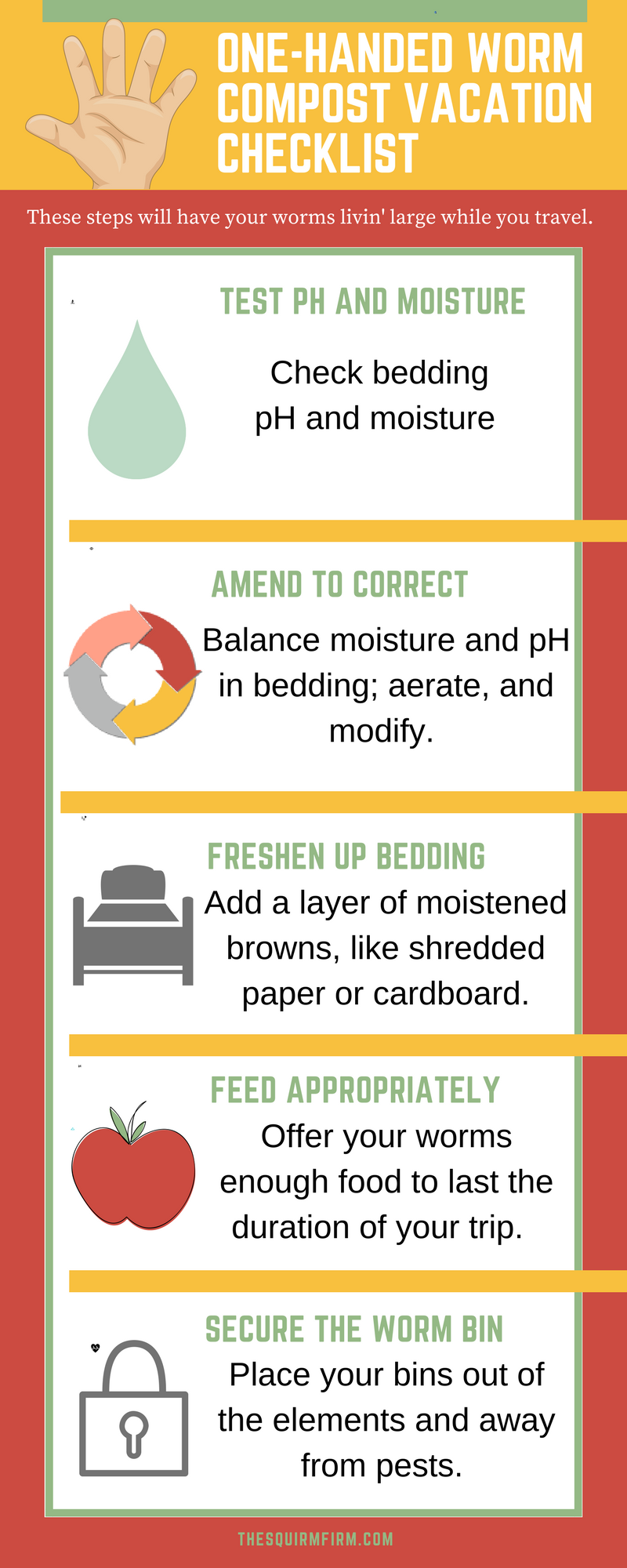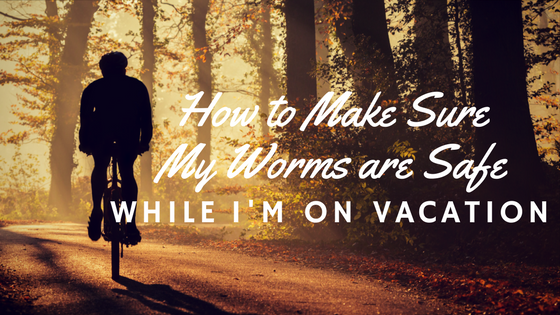You as a worm farmer have worked diligently at setting up a worm composting bin. You have learned much along the way; finally, your worms are consistently producing black gold. Can you risk it all for a much-needed vacation—or even for a fun-filled weekend at the beach? Will the worms be safe from predators—will they stay in the bin and not escape—will they survive all odds?
Here is the good news: don’t hold back—go have a gala vacation. Your worms will be safe (though busy) while you are away—all you need to do is take a few simple precautions. That way you can rest easy knowing your worms will be just fine while you are away enjoying a well-deserved vacation—and a vacation is certainly no time for worries!
Fortunately, red wiggler compost worms require very little in the way of daily maintenance. That’s one solid reason they are suitable for both children and traveling adults alike. Their routine care easily sees to it that the worms’ most basic needs are met: sufficient food and a suitable environment.
Making sure your worms are properly fed while you travel is the easiest to check off. We’ll take a closer look at just how to do that in a sec. Keeping them safe is the one thing I tend to be more particular about.
For the sake of this article safety will refer to these needs:
- A comfortable temperature range
- Appropriate moisture levels
- A secure bin
Exactly how long can I leave my worm bin unattended?
Take it from me, a properly prepared worm bin should be able to work independently for a couple of weeks before needing any attention. That’s long enough for a decent vacation, right?
How do I get started?
The first  thing you should do is take a few readings of your bin. Check the temperature, moisture, and pH to know exactly what needs attention before you say sayonara to your worms. Is everything just as it should be? If it is, then all you need to do is maintain that. If things aren’t quite perfect–now is a good time to make adjustments.
thing you should do is take a few readings of your bin. Check the temperature, moisture, and pH to know exactly what needs attention before you say sayonara to your worms. Is everything just as it should be? If it is, then all you need to do is maintain that. If things aren’t quite perfect–now is a good time to make adjustments.
- Keep temperatures between 60 and 80 degrees Fahrenheit.
- Keep the pH neutral.
- Balance the bedding (dry) and food (wet) so that overall the conditions are moist.
Come Home to a Clean House
Whenever I have the chance to get away I like to take extra care so that I don’t return to a mess or huge list of things I’ve neglected while away. One thing I always do is change the linens so that falling back into my own bed is “Ahh” instead of “Ugh”! Wouldn’t it be a good idea to freshen up your worms’ bedding too?
Add shredded paper or coconut coir before you go. This way, your worms will have new territory to explore and grow into–keeping them busy while you are away and also ensuring they have a well-oxygenated area to eat, reproduce, lay eggs, and leave you valuable worm compost. What’s more, balancing the heavy load of moist food with fresh bedding will help absorb excess moisture that may otherwise pool and cause dangerous conditions for your worms.
Feed the Masses
Once you have added to the bedding you can incorporate the food that will sustain your worms in your absence.
How many worms do you have? How much do they eat each day or week? Multiply that quantity by the length of time you plan on being away. Prepare that much food and add it in a layer beneath the bedding.
You can blend the food to distribute it more evenly. As a bonus, the blended food will release moisture into the bedding keeping it moist over time. The remaining pulp, having large surface area and air exposure, will feed the worms without rotting in the bin.
Fear Not–All Will be Well
Don’t worry too much about your worms running out of food. If your worms run out of food, they will continue to take in nutrients by consuming the bedding until it has all been processed into castings.
Where should I put my worms?
Last but not least, you should consider finding a place to keep your bin that will be as safe and environmentally consistent as possible. Indoors offers the most protection from environmental concerns and natural pests, whereas outdoors you can expect fluctuations in temperature, weather, and the presence of curious critters.
All things considered, if you can swing it–keeping your worm bin in your own home would be ideal. Be careful though, a place in front of a window could potentially roast your worms if it gets full sun during the day. And a spot near a heating or air conditioning vent could potentially blow so much air through the bin that it dries out more quickly than you would like. Basements are cold but consistent. We’re getting closer! Really, any nice neutral place that doesn’t change temperature much or get very drafty would be best.
Like a Good Neighbor…
Want to find out which neighbors are worth their weight in worm compost? The very best way to travel without vermiregret is to cover your worms’ needs by way of a helpful neighbor. I’ll bet you may even have a curious young person nearby who would love to learn more about red wiggler care. That’s hardly even a request–it’s more like doing a good deed before you go!
Ciao, Aloha, Auf Wiedersehen, Buh Bye!
Your worms are fed.
You’ve made their bed.
All things neutral, safe, and sound.
Hop a plane, be ocean bound.
Have a great trip while you’re away.
Then check out what The Squirm Firm has to say!
Sign up now for our FREE monthly newsletter for all the tips, tricks, and expert advice you need to become a worm composting master! Just once each month you will receive a brief email that will lead you to a wealth of knowledge and the tools you need to practice all you learn.
See you there!


Be the first to comment